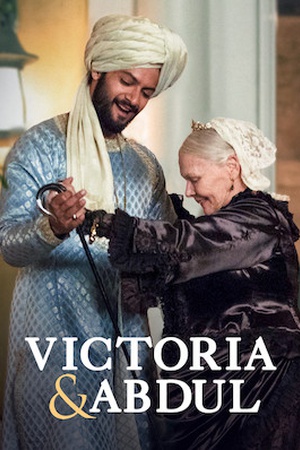by Bryan & Heather
There is a curious strain of monarchy and aristocracy fascination in the modern United States. It takes on many forms, from gossiping over the modern British royals to gushing over the latest prestige drama in the vein of Downton Abbey. A significant subgenre of these period pieces are what is sometimes referred to as “Vicporn:” stories centering on the life of the second-longest-lived British monarch, Queen Victoria I. From her trials as a young queen to her tragic love life to her attempts to hold Europe together through personal marriage diplomacy, these films, shows, and books cater to a public that wishes to romanticize not only their central figure but the entire period to which she has given her name. As this subject matter inherently coincides with Bryan’s own specialization, we sometimes find ourselves watching these media, if only for a good laugh. Such it was with the horrifying spectacle that is Victoria and Abdul.
Victoria and Abdul tells the story of Queen Victoria’s Indian Muslim footmen-cum-friend-cum-teacher, Abdul Farid, and their relationship over the last thirteen years of her reign. This is the stuff that sappy, schmaltzy romanticized history is made of, but we weren’t quite prepared for the level of pure schlock that was thrown at us, scene after scene. Abdul, a lowly worker in a British prison in Aggra, is selected to present a special coin to Victoria during the events of her Diamond Jubilee and, through nothing more than his own ebullient personality, gains the queen’s eye, becomes her personal servant, and ultimately opens her eyes to the dazzling cultures of her vast dominions in India. Even from the beginning, we were in for a rocky ride: Abdul was in fact solidly middle class (his father was the governor of that prison) and was contracted from the beginning to serve for a year in Victoria’s household. Worse, however, was yet to come.
It is true that Victoria was seen as a benevolent patron by many in India, particularly after her 1858 Proclamation widely considered to be an Indian Bill of Rights (Miles Taylor explored this relationship in depth in his Empress, reviewed here on Concerning History). Victoria and Abdul, however, takes this to a nauseating extreme. Abdul is portrayed as an unadulterated worshiper of Victoria, spontaneously kissing her feet on one occasion in some imitation of the Qing kowtow and even showing no hint of remorse or regret for leaving his life behind (including his wife) for years to play servant in Britain. Victoria, on the other hand, is portrayed almost like a sheltered, pure-hearted child, completely unaware of and shocked by the realities of her Raj. Oddly enough, the anti-Indian racism that forms the core of the movie’s conflict is also shown in perhaps the least objectionable way possible, prioritizing the feel-good story over showing any accuracy for what Abdul would have gone through in 1887 London. We found ourselves agreeing more with his fellow Indian servant Muhammad every time he cursed the Empire for oppressing the Indian subcontinent, and by the end of the film Bryan was ready to start a second Indian Rebellion all by himself.
Where this movie makes the turn from the bad into the bizarre, however, is in its visual portrayal of Victoria and Abdul’s personal relationship. In short, there is an unsettling amount of romantic tension between the elderly queen and her young servant, especially given the platonic nature of their historical relationship. We’re not sure if this was intentional or just the result of ahistorical choices such as Abdul being present in Victoria’s bedchamber while she’s in her night clothes, among other gross breaches of Victorian social etiquette. Victoria’s displeasure at learning Abdul has kept the fact of his marriage from her also plays very odd, and by the end of the movie we didn’t know how to interpret what we were seeing on the screen in front of us.
For all this and more, we cannot in good conscience recommend Victoria and Abdul to any person, history-minded or otherwise. For those who enjoy laughing at terrible, strange films, this might indeed provide some entertainment (we cannot say we weren’t having fun the entire time; just not the fun the director undoubtedly intended). For all others, however, stay far, far away from this embarrassment of a period piece.
